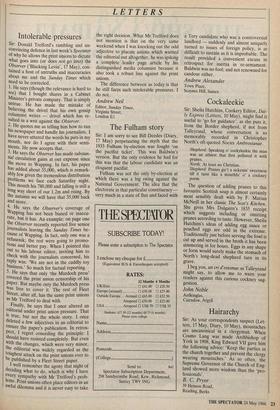LETTERS Intolerable pressures
Sir: Donald Trelford's rambling and un- convincing defence in last week's Spectator of why he allows the print unions to dictate what goes into (or does not go into) the Observer (`Blacking Levin', 17 May), con- tained a host of untruths and inaccuracies about me and the Sunday Times which need to be corrected.
1. He says (though the relevance is hard to see) that I bought shares in a Cabinet Minister's private company. That is simply untrue. He has made the mistake of believing the drivel that his own gossip columnist writes — drivel which has re- sulted in a writ against the Observer. 2: He quotes me as telling him how to run his newspaper and handle his journalists. I have never uttered the words he puts in my mouth, nor do I agree with their senti- ments. He now accepts that. 3. He says the Observer has made substan- tial circulation gains at our expense since the move to Wapping. In fact, his paper has added about 35,000, which is remark- ably few given the tremendous distribution problems we face each Saturday night. This month his 780,000 and falling is still a long way short of our 1.2m and rising. By the autumn we will have that 35,000 back and more.
4. He says the Observer's coverage of Wapping has not been biased or inaccu- rate, but it has. An example: on page one the Observer recently reported five senior journalists leaving the Sunday Times be- cause of Wapping. In fact, only one was a refusenik; the rest were going to promo- tions and better pay. When I pointed this out to his labour editor, inviting him to check with the journalists concerned, his reply was: 'We are not in the cuddly toy business.' So much for factual reporting. S. He says that only 'the Murdoch press' covered the print union censorship of his paper. But maybe only the Murdoch press was free to cover it. The rest of Fleet Street, after all, has the same print unions as Mr Trelford to deal with.
Finally, he says that I once altered an editorial under print union pressure. That is true, but not the whole story. I once deleted a few adjectives in an editorial to ensure the paper's publication. In retros- pect, I regret conceding the principle: I should have resisted completely. But even with the changes, which were very minor, the editorial was widely regarded as the toughest attack on the print unions ever to be published by a Fleet Street paper. I well remember the agony that night of deciding what to do, which is why I have every sympathy with Mr Trelford's prob- lems. Print unions often place editors in an awful dilemma and it is never easy to take the right decision. What Mr Trelford does not mention is that on the very same weekend when I was knocking out the odd adjective to placate unions which wanted the editorial out altogether, he was spiking a complete leader page article by his distinguished media columnist because it also took a robust line against the print unions.
The difference between us today is that he still faces such intolerable pressures. I do not.
Andrew Neil
Editor, Sunday Times, Virginia Street, London El














































 Previous page
Previous page